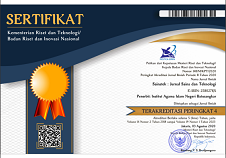INFERENCE MENGGUNAKAN FORWARD CHAINING PADA FOOD AFFORDABILITY
Abstract
Price, consumption, and production influence global food estimation. Food consumption and food production needs improving affordability, government policy and expert proposition in decision making. Expert have developed a scenario combining direct weather impact on key grain producing regions, indirect impact through crop pathogens, consequences for markets, and stock of global food. Global food production tended to increase, meanwhile consumption under production. In Indonesia, production is under consumption. It is anomaly by global situation and world condition. Government policy is tariff, export, and import. Export food influenced by price food commodity is not stable, meanwhile food import tended to increase because by national food consumption increasing demand. Government policy and expert proposition to modern society, need Expert System is increasing rapidly. In Artificial Intelligence, Expert System is a computer system that emulates the decision making ability of a human expert. There are two reasoning strategies in Expert System: Forward Chaining and Backward Chaining. The aim of this paper is to identify which reasoning strategy system (Forward Chaining). This paper focus on the concept of knowledge representation in Artificial Intelligence and implementing of Forward Chaining on Food Affordability. Food Affordability used to planning of food in the future. Finally, Inference using Forward Chaining on Food Affordability, the result it is good and can be used to planning and policy on national food.
Keywords
Full Text:
PDF (Bahasa Indonesia)References
Ajlan A. 2015. The Comparison Between Forward And Backward Chaining, International Journal of Machine Learning and Computing, vol. 5, no. 2, pp. 106-113.
Anwar S B. 2016. Using Expert Systems for Fault Management in Electrical Power Systems, Global Journal of Engineering Science and Researches, vol. 3, no. 2, pp. 35-40.
Babu S, PK dan Perumal GJ. 2016. The Development of Expert-System for Corrosion Protection of Ship Structures, IOSR Journal of Mechanical and Civil Engineering, pp. 56-63.
Ergado AA. 2016. Self Learning Computer Trouble Shooting Expert System, International Journal of Artificial Intelligence & Applications, vol. 7, no. 1, pp. 45-58.
Haemmerle R. 2014. On Combining Backward and Forward Chaining in Constraint Logic Programming, PPDP 14: ACM, pp. 1-12.
Herrera JFA. 2012. Integer Programming Applied to Rule Based Systems, Procedia Computer Science: Elsevier, vol. 9, pp. 1553-1562.
Hestiningsih & Idhawati, 2015. Artificial Intelligence, e-book, pp. 1-45.
Kamala SPR & Justus S. 2016. Towards Mork: Model For Representing Knowledge, International Journal Modern Education and Computer Science, vol. 8, no. 3, pp. 45-53.
Kamley S, S Jaloree, dan RS Thakur. 2016. Performance Comparison between Forward and Backward Chaining Rule Based Expert System Approaches Over Global Stock Exchanges, International Journal of Computer Science and Information Security, vol. 14, no. 3, pp. 74-81.
Kapoor N dan N Bahl. 2016. Comparative Study of Forward and Backward Chaining In Artificial Intelligence, International Journal of Engineering and Computer Science, vol. 5, iss. 4, pp.16239-16242.
Kodavade DV. 2016. Knowledge Based Approach for Fault Diagnosis in Electronic Circuit Boards, International Journal of Control and Automation, vol. 9, no.1, pp. 293-308.
Mzori BHS. 2015. Forward and Backward Chaining Techniques of Reasoning in Rule-Based Systems, thesis, Eastern Mediterranean University, pp. 1-53.
Negnevitsky M. 2011. Artificial Intelligence: A Guide to Intelligent Systems (3rd Edition), Addison Wesley.
Sharma T, N Tiwari dan D Kelkar. 2012. Study Of Difference Between Forward And Backward Reasoning, International Journal of Emerging Technology and Advanced Engineering, vol. 2, iss.10, pp. 271-273.
Shi H, K Maly dan D Chong. 2016. Backward Chaining Ontology Reasoning Systems With Custom Rules, International World Wide Web Conference Committee, ACM, pp. 381-386.
Thieme LS. 2013. Artificial Intelligence: First Order Logic Inference, Course on Artificial Intelligence, pp. 1-20.
Trade Policy Research and Development Agency, 2015. Pre-Outlook Economy of Farming 2016, The Ministry of Trade of the Republic of Indonesia.
DOI: http://dx.doi.org/10.31958/js.v9i2.671
Refbacks
- There are currently no refbacks.
Copyright (c) 2017 ADRIYENDI ADRIYENDI

This work is licensed under a Creative Commons Attribution-NonCommercial 4.0 International License.
Indexed by:
__________________________________________________________________________
Sainstek: Jurnal Sains dan Teknologi
ISSN 2085-8019 (print) | 2580-278x (online)
Published by Institut Agama Islam Negeri Batusangkar
Email: sainstek@iainbatusangkar.ac.id
This work is licensed under a Creative Commons Attribution-NonCommercial-NoDerivatives 4.0 International License.

















